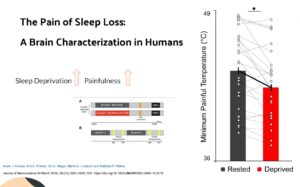A Brain Characterization in Humans→ Show that even modest nightly changes in sleep quality (increases and decreases) within an individual determine consequential day-to-day changes in experienced pain (decreases and increases, respectively). → Sleep as a novel therapeutic target for pain management within and outside the clinic, including circumstances where sleep is frequently short yet pain is abundant (e.g., the hospital setting).

Pain resulted from Sleeping
Sleep and pain are related
Sleep disturbance may impair key processes that contribute to the development and maintenance of chronic pain, including endogenous pain inhibition and joint pain.
→ Chronic pain (such as pain in the spine, neck, hips, and legs, can cause discomfort when you are trying to get comfortable and sleep.)
→ Successful sleep requires a certain level of comfortability, and pain often keeps the body from reaching a state of comfort. As a result, pain impacts your ability to fall asleep and stay asleep

→ Migraines and headaches

